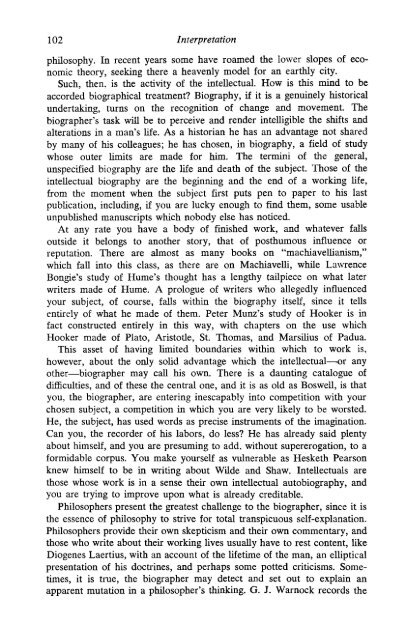philosophy - Interpretation
philosophy - Interpretation
philosophy - Interpretation
You also want an ePaper? Increase the reach of your titles
YUMPU automatically turns print PDFs into web optimized ePapers that Google loves.
102 <strong>Interpretation</strong><br />
phUosophy. In recent years some have roamed the lower slopes of eco<br />
nomic theory, seeking there a heavenly model for an earthly city.<br />
Such, then, is the activity<br />
of the inteUectual. How is this mind to be<br />
accorded biographical treatment? Biography, if it is a genuinely historical<br />
undertaking, turns on the recognition of change and movement. The<br />
biographer's task wiU be to perceive and render intelligible the shifts and<br />
alterations in a man's life. As a historian he has an advantage not shared<br />
by many of his coUeagues; he has chosen, in biography, a field of study<br />
whose outer limits are made for him. The termini of the general,<br />
unspecified biography<br />
are the life and death of the subject. Those of the<br />
inteUectual biography are the beginning and the end of a working hfe,<br />
from the moment when the subject first puts pen to paper to his last<br />
publication, including, if you are<br />
lucky enough to find them,<br />
some usable<br />
unpublished manuscripts which<br />
nobody<br />
else has noticed.<br />
At any<br />
rate you have a body of finished work, and whatever falls<br />
outside it belongs to another story, that of posthumous influence or<br />
reputation. There are almost as many<br />
books on<br />
"machiavelhanism,"<br />
which faU into this class, as there are on Machiavelli, whUe Lawrence<br />
Bongie's study of Hume's thought has a lengthy taUpiece on what later<br />
writers made of Hume. A prologue of writers who aUegedly influenced<br />
your subject, of course, faUs within the biography itself, since it teUs<br />
entirely of what he made of them. Peter Munz's study of Hooker is in<br />
fact constructed entirely in this way, with chapters on the use which<br />
Hooker made of Plato, Aristotle, St. Thomas, and Marsilius of Padua.<br />
This asset of having hmited boundaries within which to work is,<br />
however, about the only sohd advantage which the inteUectual or any<br />
other biographer may<br />
caU his own. There is a daunting<br />
catalogue of<br />
difficulties, and of these the central one, and it is as old as BosweU, is that<br />
you, the biographer, are entering inescapably into competition with your<br />
chosen subject, a competition in which you are very hkely to be worsted.<br />
He, the subject, has used words as precise instruments of the imagination.<br />
Can you, the recorder of his labors, do less? He has already<br />
said plenty<br />
about himself, and you are presuming to add, without supererogation, to a<br />
formidable corpus. You make yourself as vulnerable as Hesketh Pearson<br />
knew himself to be in writing about WUde and Shaw. InteUectuals are<br />
those whose work is in a sense their own inteUectual autobiography, and<br />
you are<br />
trying to improve upon what is already creditable.<br />
Philosophers present the greatest chaUenge to the biographer, since it is<br />
the essence of phUosophy to strive for total transpicuous self-explanation.<br />
Plhlosophers provide their own skepticism and their own commentary, and<br />
those who write about their working lives usuaUy have to rest content, like<br />
Diogenes Laertius, with an account of the lifetime of the man,<br />
presentation of his doctrines,<br />
an elliptical<br />
and perhaps some potted criticisms. Some<br />
times, it is true, the biographer may detect and set out to explain an<br />
apparent mutation in a philosopher's thinking. G. J. Warnock records the
















